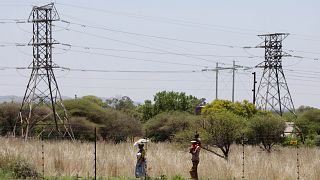South Africa
South African Minister of Justice and Correctional Services Ronald Lamola says he is working to provide "equitable access to land" to correct unsustainable, "unequal and skewered patterns of land ownership"
His comments come after a bid to allow South Africa's government to expropriate land without compensation as a way to redress past injustices flopped when lawmakers rejected a bill to change the constitution on Tuesday.
"We work together for the people of this country to have equitable access to the land. Because the unequal and the skewered patterns of land ownership are not sustainable. We need to put the redistribution bill, we need to put the expropriation bill, so the constitution does allow for the policies I am talking about. The constitution, because of the nature of our country where there is skewed ownership of the land, where the majority is the white population owning majority of the land and the majority of the population which is black, not owning, owning the minority of the land. It's a misnomer that must be resolved, this must be done in a constitutional way."
But the government was not perturbed saying it would turn to alternative legislation to redistribute land.
The proposed law failed to garner the required two-thirds majority in the 400-seat parliament, with 204 lawmakers voting in favour and 145 against.
Black South Africans were dispossessed of their land during three centuries of colonialism and apartheid, the system of white-minority rule that officially ended in 1994.
When the African National Congress (ANC) came to power in 1994, the government pledged to redistribute 30 percent of South Africa's 60,000 commercial farms to black ownership.
But as of today, whites who comprise eight percent of the population "possess 72 percent of (the) farms", according to figures cited by President Cyril Ramaphosa.
Only around 10 percent are owned by blacks, who make up four-fifths of the population.
A multi-party committee had for the past few years been working on the proposals, which would have allowed the state to take farmland from private owners without paying for it, and parcel it out to landless blacks.
The issue of whether to take land without compensating its current owners is highly divisive and emotive in South Africa.
The ruling ANC's pointman on the land reforms, Mathole Motshekga, told fellow lawmakers before the vote that the bill had sought "to address this inhuman crime, crime against the African majority."
But his argument was shot down by the largest opposition party, the Democratic Alliance, which contended that the proposal violated property rights and stoked uncertainty.
"This is not what the country needs now in the time of economic devastation during the Covid pandemic," said DA lawmaker Annelie Lotriet.
She lauded the failure of this "disastrous piece of legislation" as a victory for constitutional order.
"In Venezuela and Zimbabwe, tampering with property rights collapsed their economies, led to widespread hunger and resulted in wholesale capital flight," she said.
- 'Not end of the road'
The leftist Economic Freedom Fighters' leader, Julius Malema, whose party introduced the motion to amend the constitution, rejected the bill as not going far enough.
"We want the state to be the custodian of the land," he said.
Justice Minister Ronald Lamola told AFP he was "saddened" that the ANC failed to muster enough votes, but added: "It's not the end of the road for us."
"We are going to use our majority" to push through several others piece of legislation to achieve the land reforms, he said.
"It is in the interest of the land owners that they come to the party with government. We work for the people of this country to have equitable access to land, because the unequal and skewed patterns of land ownership are not sustainable," he told AFP.
Experts confirmed that the government has other options.
Separate from this process is expropriation legislation that is before parliament and is expected to be adopted next year.
"That's actually far more important... and will enable expropriation to happen more easily," said Wilmien Wicomb, a specialist lawyer on land issues with the rights group Legal Resources Centre.
"That legislation will enable the state to expropriate, to know how to expropriate, to be able to do it more effectively and in what instance they can pay no compensation or just little compensation".
"In a sense this constitutional amendment was a bit cosmetic," she added.
Apart from the expropriation bills, the justice minister also pointed at other laws in the works including the land court bill and a land redistribution bill. A restitution law is already in place.













Go to video
Semenya ruling shakes foundations of gender rules in sport
01:53
SMES under pressure as business confidence hits four-year low in South Africa
01:07
30% on South African imports: Ramaphosa hits back at new Trump tariffs
00:59
South Africa, Austria agree to strengthen ties